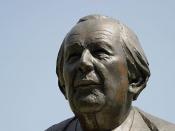What can we learn about how infants think from their performance on ?hidden object? tasks? There are different explanations as to how children develop and there will always be conflicting views when it comes to identifying the behaviour of infants, as their behaviour is limited. This makes the research limited; the methods used generally measure verbal responses or complex behaviours. As a child enters the world the first simple behaviours are either learnt or biologically developed. First sign behaviours are looking and sucking rates but these simple behaviours can provide psychologists with a basis to observe and explore how a child naturally develops. The other behaviours or reactions that are measured on babies are also movement of hands and facial expressions.
The techniques used for researching babies is limited due to limited behaviours and reactions this is why the key research method in studying early infants is mainly observation. Observation research can occur in two ways.
The infant can be observed under structured circumstances or in a naturalistic way. Research on infants can often be a complicated matter. This is due to many factors. There are opposing theoretical perspectives about how development takes place in infancy and this paper will be looking toward Piaget?s view on development in infancy.
There are opposing views and evidence regarding cognitive development in infancy and one strong view was provided by Jean Piaget. Piaget entertained the constructivist view on development and emphasised that infants are in control of there own understanding and they do this by attempting to understand the environment by exploring it, and they do this through constructing schema?s through 3 process? which are namely assimilation, accommodation and equilibration.
An infants understanding (particularly with object?s) they apparently, adapt an existing schema when they come across conflicting and new information. In this...


